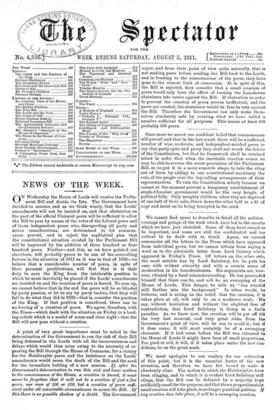A point of very great importance must be noted in
the determination of the Government to run the risk of their Bill being defeated in the Lords with all the inconveniences and delays which would then arise owing to the necessity of re- passing the Bill through the House of Commons; for a victory for the Halsburyite peers and the insistence on the Lords' amendments' would mean the death of the Bill and the need for the immediate holding of a new session. If, after the Government's determination to run this risk and leave matters to the commonsense of the House, a creation is forced, it must never be forgotten that it will not be a creation of just a few peers, nor even of 100 or 150, but a creation of peers 84. cient under all conceivable circumstances to secure the Bill. Of this there is no possible shadow of a doubt. The Government
argue, and from their point of view quite naturally, that in not making peers before sending the Bill back to the Lords, and in trusting to the commonsense of the peers, they have gone to the utmost limit of concession. If, in spite of this, the Bill is rejected, they consider that a small creation of peers would only have the effect of turning the Lansdowne abstainers into voters against the Bill. If abstention in order to prevent the creation of peers proves ineffectual, and the peers are created, the abstainers would be free to vote against the Bill. Therefore the Government can only make them- selves absolutely safe by creating what we have called a number sufficient for all purposes. This means at least 400 probably 500 peers.






































